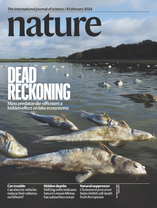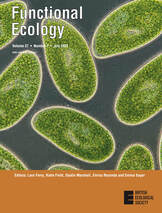- Coming soon
41. Gibert, J.P., Z.-Y. Han, R. Wong, K. DeWitt, B.R. Silliman, D.J. Wieczynski. The energetic tug-of-war: a shifting balance between bottom- and top-down control determines food web responses to rising temperatures (IN PREP)
40. *Liu, M.Z.*, Z.-Y. Han, Y. Yuan, K. DeWitt, D.J. Wieczynski, K.M. Yammine, A. Yammine, R. Zufall, A. Siepielski, D. Chalker, M. Onishi, F.A. Machado & J.P. Gibert. Temperature dependent selection shapes microbial thermal performance curves and population genetic makeup (IN PREP)
39. Han, Z.-Y., Y. Yuan, K. DeWitt, D.J. Wieczynski, A. Yammine, M. Onishi & J.P. Gibert. Temperature mediates the effect of predation and competition on prey evolution (IN PREP).
38. DeWitt, K., A.A. Carrell, J.D. Rocca, S. Votzke, A. Yammine, D.J. Weston, D. A. Pelletier & J.P. Gibert. Predation by a protist community mediates temperature and nutrient effects on bacterial communities (IN REVISION)
( *undergraduate student* )
( +shared first co-authorship+ )
( lab member )
40. *Liu, M.Z.*, Z.-Y. Han, Y. Yuan, K. DeWitt, D.J. Wieczynski, K.M. Yammine, A. Yammine, R. Zufall, A. Siepielski, D. Chalker, M. Onishi, F.A. Machado & J.P. Gibert. Temperature dependent selection shapes microbial thermal performance curves and population genetic makeup (IN PREP)
39. Han, Z.-Y., Y. Yuan, K. DeWitt, D.J. Wieczynski, A. Yammine, M. Onishi & J.P. Gibert. Temperature mediates the effect of predation and competition on prey evolution (IN PREP).
38. DeWitt, K., A.A. Carrell, J.D. Rocca, S. Votzke, A. Yammine, D.J. Weston, D. A. Pelletier & J.P. Gibert. Predation by a protist community mediates temperature and nutrient effects on bacterial communities (IN REVISION)
( *undergraduate student* )
( +shared first co-authorship+ )
( lab member )
- 2024
37. Silliman B.R., M.J.S. Hensel, J.P. Gibert, D.J. Wieczynski, P. Daleo, C. Smith, C. Angelini, A. Paxton, A. Adler, A.H. Altieri, T.M. Palmer, J.N. Griffin, M.I. O’Connor, J. van de Koppel, J. Poulsen, M. Rietkerk, Q. He, M. Bertness & S. Valdez. Harnessing Ecological Theory to Enhance Ecosystem Restoration. Current Biology 34 (9): PR418-R434. PDF
36. Kilner, C.L., A.A. Carrell, S. Votzke, A. Yammine, K. DeWitt, J. A. Shaw, D.A. Pelletier, D.J. Weston & J.P. Gibert. Temperature and CO2 interactively drive the compositional and functional structure of peatland protist communities. Global Change Biology 30 (3): e127203. PDF
35. Tye, S.P., S.B. Fey, J.P. Gibert & A.M. Siepielski. Predator mass mortality events restructure food webs via trophic decoupling. Nature 626: 335-340. PDF
36. Kilner, C.L., A.A. Carrell, S. Votzke, A. Yammine, K. DeWitt, J. A. Shaw, D.A. Pelletier, D.J. Weston & J.P. Gibert. Temperature and CO2 interactively drive the compositional and functional structure of peatland protist communities. Global Change Biology 30 (3): e127203. PDF
35. Tye, S.P., S.B. Fey, J.P. Gibert & A.M. Siepielski. Predator mass mortality events restructure food webs via trophic decoupling. Nature 626: 335-340. PDF
- 2023
34. Han, Z.-Y., D.J. Wieczynski, A. Yammine & J.P. Gibert. Temperture and nutrients drive eco-phenotypic dynamics in a microbial food web. Proceedings of the Royal Society B 290: 20222263. PDF
Featured In:
Featured In:
33. Wieczynski, D.J., H.V. Moeller, J.P. Gibert. Mixotrophs generate alternative carbon states under warming. Functional Ecology 37(7): 1774–1786. PDF
Featured In:
Featured In:
|
Functional Ecology's July Issue Cover:
|
32. Wieczynski, D.J., K.M. Yoshimura, E.R. Denison, S. Geisen, J.M. DeBruyn, A.J. Shaw, D.J. Weston, D.A. Pelletier, S.W. Wilhelm & J.P. Gibert. Viral infections mediate microbial food web controls on the global carbon cycle under warming. FEMS Microbiology Ecology 99: 1-11. PDF
Selected as Editor's Choice
Featured In:
Selected as Editor's Choice
Featured In:
31. Gibert, J.P., D.J. Wieczynski, Z.-Y. Han, A. Yammine. Rapid eco-phenotypic feedbacks determine the temperature response of biomass. Ecology and Evolution
13: e9685. PDF
13: e9685. PDF
- 2022
30. +Gibert, J.P.+, +J.N. Grady+ & A.I. Dell. The food web consequences of thermal asymmetries. Functional Ecology 36:1887–1899. PDF
29. Gibert, J.P., Z.-Y. Han, D.J. Wieczynski, S. Votzke & A. Yammine. Feedbacks between size and density determine rapid eco-phenotypic dynamics. Functional Ecology 36: 1668–1680. PDF
29. Gibert, J.P., Z.-Y. Han, D.J. Wieczynski, S. Votzke & A. Yammine. Feedbacks between size and density determine rapid eco-phenotypic dynamics. Functional Ecology 36: 1668–1680. PDF
Featured In:
28. Rocca, J.D., A. Yammine, M. Simonin & J.P. Gibert. Predation by protists mediates the temperature response of bacterial communities. Frontiers in Microbiology 13:847964. PDF
27. Pardo-De la Hoz, C.J., I.D. Medeiros, J.P. Gibert, P.-L. Chagnon, N. Magain, J. Miadlikowska, F. Lutzoni. A new approach to study phylogenetic structure of specialization in ecological networks. Ecology and Evolution 12 (3): e8649. PDF
27. Pardo-De la Hoz, C.J., I.D. Medeiros, J.P. Gibert, P.-L. Chagnon, N. Magain, J. Miadlikowska, F. Lutzoni. A new approach to study phylogenetic structure of specialization in ecological networks. Ecology and Evolution 12 (3): e8649. PDF
- 2021
26. Wieczynski, D.J., *P. Singla*, *A. Doan*, *A. Singleton*, Z. Han, S. Votzke, A. Yammine & J.P. Gibert. Linking species traits and demography to explain complex temperature responses across levels of organization. Proceedings of the National Academy of Sciences 118 (42): e2104863118. PDF
Featured In:
Featured In:
25. *Singleton, A.*, *M. Liu*, S. Votzke, A. Yammine & J.P.Gibert. Temperature weakens the positive effect of genetic diversity on population growth. Ecology & Evolution 11:17810–17816. PDF
24. Barbour, M. A. & J.P. Gibert. Genetic and plastic rewiring of food webs under climate change. Journal of Animal Ecology 90 (8): 1814-1830. PDF
23. Gibert, J.P. & D.J. Wieczynski. Constraints and variation in food web link-species space. Biology Letters 17: 20210109. PDF
- 2019
22. +Fey, S.B.+, +J.P. Gibert+, & A.M. Siepielski. The consequences of mass mortality events for the structure and dynamics of biological communities. Oikos 128: 1679–1690. PDF
Selected as Editor's Choice
21. Gibert, J.P. Temperature directly and indirectly influences food web structure. Scientific Reports 9 (1): 5312. PDF
20. Gibert, J.P. & J.D. Yeakel. Eco-evolutionary origins of diverse abundance, biomass, and trophic structures in food webs. Frontiers in Ecology and Evolution 7:15, Special Issue: "Unifying Ecology Across Scales: Progress, Challenges and Opportunities". PDF
19. DeLong, J.P. & J.P. Gibert. Larger Area Facilitates Richness-Function Effects in Experimental Microcosms. The American Naturalist, 193 (5): 738- 747. PDF
18. Gibert, J.P. & J.D. Yeakel. Laplacian matrices and Turing bifurcations: revisiting Levin 1974 and the consequences of spatial structure and movement for ecological dynamics. Theoretical Ecology, 12(3): 265–281. PDF
Selected as Editor's Choice
21. Gibert, J.P. Temperature directly and indirectly influences food web structure. Scientific Reports 9 (1): 5312. PDF
20. Gibert, J.P. & J.D. Yeakel. Eco-evolutionary origins of diverse abundance, biomass, and trophic structures in food webs. Frontiers in Ecology and Evolution 7:15, Special Issue: "Unifying Ecology Across Scales: Progress, Challenges and Opportunities". PDF
19. DeLong, J.P. & J.P. Gibert. Larger Area Facilitates Richness-Function Effects in Experimental Microcosms. The American Naturalist, 193 (5): 738- 747. PDF
18. Gibert, J.P. & J.D. Yeakel. Laplacian matrices and Turing bifurcations: revisiting Levin 1974 and the consequences of spatial structure and movement for ecological dynamics. Theoretical Ecology, 12(3): 265–281. PDF
- 2018
17. DeLong, J.P., G. Bachman, J.P. Gibert, T.M. Luhring, K.L. Montooth, A. Neyer, B. Reed. Habitat, latitude, and body mass influence the temperature dependence of metabolic rate. Biology Letters, 14: 20180442. PDF
16. Yeakel, J.D., J.P. Gibert, P. Westley, & J. Moore. Eco-evolutionary dynamics and collective straying: implications for salmon metapopulation robustness. Philosophical Transactions of the Royal Society B, 373 (1746): 20170018. PDF
15. DeLong, J.P., T.C. Hanley, J.P. Gibert, L.M. Puth, D.M Post. Life history traits and functional processes generate multiple pathways to ecological stability. Ecology, 99 (1): 5-12. PDF
16. Yeakel, J.D., J.P. Gibert, P. Westley, & J. Moore. Eco-evolutionary dynamics and collective straying: implications for salmon metapopulation robustness. Philosophical Transactions of the Royal Society B, 373 (1746): 20170018. PDF
15. DeLong, J.P., T.C. Hanley, J.P. Gibert, L.M. Puth, D.M Post. Life history traits and functional processes generate multiple pathways to ecological stability. Ecology, 99 (1): 5-12. PDF
- 2017
14. Gibert, J.P. & J.P. DeLong. Phenotypic variation explains food web structural patterns. Proceedings of the National Academy of Sciences 114 (42): 11187- 11192. PDF / SupMat
13. Gibert, J.P., *R. Allen*, *R. Hruska* & J.P. DeLong. The ecological consequences of environmentally induced phenotypic changes. Ecology Letters 20 (8): 997- 1003. PDF / SupMat
12. DeLong, J.P., J.P. Gibert, T.M. Luhring, G. Bachman, B. Reed, A. Neyer, K.L. Montooth. The combined effects of reactant kinetics and enzyme stability explain the temperature dependence of metabolic rate. Ecology and Evolution 7 (11): 3940–3950. PDF
- 2016
11. Gibert, J.P. The effect of phenotypic variation on metapopulation persistence. Population Ecology 58 (3): 345-355. PDF
Selected as Editor's Choice
Selected as Editor's Choice
10. Gibert, J.P., M-.C. Chelini, M.F. Rosenthal, J.P. DeLong. Crossing regimes of temperature dependence in animal movement. Global Change Biology 22: 1722- 1736. PDF / SupMat
Featured In:
Featured In:
9. Sebastián-González, E., M. Moleón, J.P. Gibert, F. Botella, P. Mateo-Tomás, P. Olea, P.R. Guimarães Jr & J.A. Sánchez-Zapata. Nested species-rich vertebrate scavenging networks support high levels of interspecific competition. Ecology 97 (1): 95-105. PDF
8. DeLong. J.P. & J.P. Gibert. Gillespie eco-evolutionary models (GEMs) reveal the role of heritable trait variation in eco-evolutionary dynamics. Ecology and Evolution 6(4): 935–945. PDF
7. DeLong, J.P., V.E. Forbes, N. Galic, J.P. Gibert, R. Laport, *J.S. Phillips*, & J.M. Vavra. How fast is fast? Eco-evolutionary dynamics and rates of change in populations and phenotypes. Ecology and Evolution 6(2): 573–581. PDF
Featured In:
Featured In:
- 2015
6. Gibert, J.P., A.I. Dell, J.P. DeLong & S. Pawar. Scaling up trait variation from individuals to ecosystems. Advances in Ecological Research 52: 1-17. PDF
5. Gibert, J.P. & J.P. DeLong. Individual variation decreases interference competition among predators but increases species persistence. Advances in Ecological Research 52: 45-64. PDF
- 2014
4. Gibert, J.P. & C.E. Brassil. Individual variation reduces interaction strengths in a consumer-resource system. Ecology and Evolution 4 (18): 3703-3713
PDF / SupMat
PDF / SupMat
3. Gibert, J.P. & J.P. DeLong. Temperature alters food web body-size structure. Biology Letters 10 (8): 20140473. PDF
2. Raimundo, R.L.G., J.P. Gibert, D.H. Hembry & P.R. Guimarães Jr. Conflicting selection in the course of adaptive diversification: the interplay between mutualism and intraspecific competition. The American Naturalist 183 (3): 363-375. PDF / SupMat
- 2013
1. Gibert, J.P., M.M. Pires, J.N. Thompson & P.R. Guimarães Jr. The spatial structure of antagonistic species affects coevolution in predictable ways. The American Naturalist 182 (5): 578-591. PDF / SupMat


















